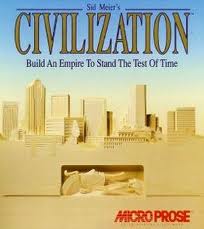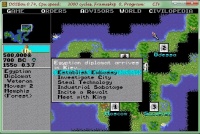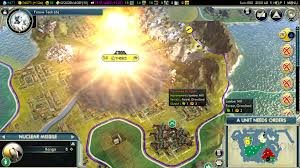Civilization (Video Game Series)
|
Civilization is a series of turn-based games created by Sid Meier and developed by Firaxis Games. Civilization VI, the most recent game in the series, sold over 2 million copies worldwide in the first 6 months after its release in October 2016[1] Civilization, the first in its series, was first released in 1991, while the latest expansion pack of Civilization VI, Gathering Storm, was released on February 14, 2019. [2] Civilization VI is available on the PC, iPad, and Nintendo Switch, while Civilization Revolution, released in 2008, is available on the Xbox360, PS3, Nintendo DS, and also mobile platforms such as iOS. [3]The series has sold 40 million copies. [4]
Contents
Game Overview
The main objective of the game is to “Build an empire to stand the test of time”. Players choose a historical civilization and choose to play as a leader from that civilization. As the series has gone on, the number of civilizations has increased. The first game of the series, Civilization, offered players 14 different civilizations to choose from while Civilization VI offers 39 civilizations[5].
In the most popular game mode for a single player, players pick the size of the map, the length of the game, and the difficulty level and how aggressive the computer will be. The game starts in the year 4000BC. Usually a player begins two or three units, depending on the civilization, including a settler who builds the player's the first city. After building the first city, a player has access to foreign affairs advisors, cultural advisors, military advisors, diplomatic advisors and scientific advisors. Each of them is important because they help players to build a well-balanced empire. Players can use them in order to decide which technology they want to discover, what unit or which building one wants to build in a city, or who they want to trade with. Advisors also keep players informed of diplomatic and military situations that a player may need to respond to. [6]Since Civilization is a turn-based game, the player has to wait until every other civilization ends their turn in order to make their next move. This time between turns means that games can take several hours. Civilization is known for its “one more turn” mode, which is activated after reaching the year 2050 in-game when the actual scoring game is ended. One player, Lycerius has been playing one game, in Civilization II, for over ten years. He has reached the year AD 3991. [7]
How to Win
In Civilization, players can win in multiple ways, such as cultural victories, conquering other civilizations, or winning a space race. Here are the exact ways of winning in Civilization 6 [8]
- Cultural, achieved by attracting a large number of tourists to the player's civilization.
- Religious, achieved by making the player's religion the dominant religion across all civilizations.
- Domination, achieved by conquering the capital city of all other players.
- Science, achieved by researching advanced technologies and completing a series of space missions.
- Time, achieved by having the highest score when the game ends automatically at the end of year 2050. After that, a player can still play but cannot change the result of the game.
Major Releases
| Title | Year | Note |
| Civilization | 1991 | First Civilization game |
| Civilization II | 1996 | |
| Civilization III | 2001 | |
| Civilization IV | 2005 | |
| Civilization V | 2010 | |
| Civilization Revolution | 2008 | First game developed for mobile platforms such as iOS and handheld gaming systems |
| Civilization World | 2011 | A Beta version of a game created for Facebook |
| Civilization VI | 2016 | Latest edition of the full game not including expansion packs |
Ethical Issues
Virtue Ethics and Violence
In the Civilization series, players make choices on how they want to play the game. Among the possibilities, players can choose violence, sacking and burning cities or building nuclear weapons. As violence is optional in Civilization, and players can win the game without taking any violent actions, players are free to decide whether violence is ethical in gameplay. Shannon Vallor notes that virtue ethics are not merely what people think or believe, but rather what they do, and what they do repeatedly. [10] Therefore, players have the opportunity to express and develop their virtues through their choices in the game. As Civilization can be played online against other people, the expression of these virtues becomes even more important, as it becomes a microcosm of society.
Structural Bias
The Civilization series has drawn criticism for its over-simplified view of history. It has a Eurocentric, imperialistic framing in which civilizations advance along the path that Western civilizations have taken. [11] There are limited options to play different types of civilizations, such as nomadic groups. Civilization presents the end goal of all civilizations as becoming like the United States and globalizing, ignoring or minimizing the contributions and paths of non-Western civilizations through history.[11]
This Western-centric focus is at the core of the series. Phillip Brey notes that information systems are not neutral, but rather have biases and embedded values built into them, knowingly or unknowingly, by their designers. [12] He promotes Value Sensitive Design, in which designers identify morally opaque practices and think about what design choices are made regarding these practices. [12] With Value Sensitive Design, the series may lose its Western bias and reflect other types of civilizations throughout history.
Cheating
Several of the early Civilization games had cheat codes,[13], and it is still possible to "cheat" the newer games through the use of hacks, mods, or unfair strategies. [14]. Although most of these cheating strategies only work in single-player games, research shows that that just makes players more likely to cheat. Players are more likely to cheat against a machine than against an actual person, even when the machine has human-like characteristics, such as the AI players in civilization. [15] There is no consensus on what constitutes cheating in a single-player game, let alone whether it is actually unethical.[16] However, it is possible to hack the game to allow cheats in multiplayer mode, thus gaining an advantage against a human opponent. Cheating in multiplayer games harms the experience for the other players, and is more unethical than cheating a computer.[15]
Violation of Privacy
Civilization VI generated controversy when it released because it came packaged with an ad-tracking program called Red Shell. [17] The program works by secretly recording how often players of the game click on certain advertisements. [17]. This program is especially malicious because it tracks players without their knowledge.
The packaging of this spyware with the game was so problematic because it was a deliberate violation of players' informational privacy, defined by Luciano Floridi as "freedom from informational interference or intrusion." [18] By secretly installing the software, the game greatly reduced informational friction that players may have wished to maintain, as the adware automatically gathered data about players. [18] Moreover, by doing this without the players' knowledge, the program removed any control the players may have had over this part of their informational identity. [19]. When players found out about Red Shell being installed with Civilization VI, they created such a controversy, due to the violation of their privacy and the loss of control of their information, that Firaxis, the studio that made the game, removed the software from players' computers. [17]
See Also
External Links
References
- ↑ Chan, Stephanie. “Civ VI was a large contributor to Take-Two’s net revenue growth.” Venture Beat. May 23, 2017. https://venturebeat.com/2017/05/23/civ-vi-was-a-large-contributor-to-take-twos-net-revenue-growth/
- ↑ ”Civilization VI: Gathering Storm Available Now.” Civilization. February 14, 2019. https://civilization.com/news/entries/civilization-vi-gathering-storm-new-expansion-release-date-pc-february-14-2019.
- ↑ “Civilization VI.” Civilization. Accessed April 22, 2019. https://civilization.com/buy/#civilization-vi/civilization-vi-standard-edition/united-states
- ↑ Civilization Revolution Official Site Home Page
- ↑ "Civilization 6," Wikipediak accessed April 22, 2019, https://en.wikipedia.org/wiki/Civilization_VI
- ↑ >"Advisors",Civilizaton Official Wiki Site, accessed April 22, 2019, https://civilization.fandom.com/wiki/Advisor.
- ↑ Frum, Larry, "10-year-long video game creates 'hellish nightmare' world." CNN Business, last modified June 19, 2012 http://www.cnn.com/2012/06/18/tech/gaming-gadgets/civilization-ii-ten-years/index.html/.
- ↑ "Victory (Civ6), Civilizaton Official Wiki Site, accessed April 22, 2019, https://civilization.fandom.com/wiki/Victory_(Civ6).
- ↑ "Civilization," Civilization, accessed April 22, 2019, https://civilization.com/.
- ↑ Vallor, Shannon. "Social networking technology and the virtues." Ethics and Information Technology 12, no. 2 (2010): 157-170. https://umich.instructure.com/courses/273552/files/9617520?module_item_id=590901
- ↑ 11.0 11.1 Poblocki, Kacper. "Becoming-state: The bio-cultural imperialism of Sid Meier's Civilization." Focaal - Journal of Global and Historical Anthropology 39 (2002): 163-177. https://repozytorium.amu.edu.pl/bitstream/10593/8609/1/poblocki%20becoming%20state%20and%20sid%20meiers%20civilization.pdf
- ↑ 12.0 12.1 Brey, Phillip. "Values in technology and disclosive computer ethics." In The Cambridge Handbook of Information and Computer Ethics, edited by Luciano Floridi. 41-58. Cambridge: Cambridge University Press, 2010. https://umich.instructure.com/courses/273552/files/9617491?module_item_id=590847
- ↑ "Sid Meier’s Civilization: Cheats." Civilization Fanatics Center. Accessed April 22, 2019. https://www.civfanatics.com/civ1/cheats/.
- ↑ Manlupig, Jr., Mario. "Civilization 6 Hack: How To Exploit The Game And Claim Victory." iTech Post. Last modified October 29, 2016. http://www.itechpost.com/articles/48012/20161029/civilization-6-hack-how-to-exploit-the-game-and-claim-victory.htm
- ↑ 15.0 15.1 Cohn, Alain, Tobias Gesche, and Michel Maréchal. Honesty in the Digital Age. Working paper no. 280. Department of Economics, University of Zurich. February, 2018. https://umich.instructure.com/courses/273552/modules/items/618259
- ↑ Consalvo, Mia. "Gaining Advantage: How Videogame Players Define and Negotiate Cheating". In Cheating: Gaining Advantage in Videogames. Cambridge, MA: MIT Press, 2007. https://umich.instructure.com/courses/273552/files/9617490?module_item_id=590935
- ↑ 17.0 17.1 17.2 O'Connor, Alice, "Civilization VI removes Red Shell ad-tracking software," Rock Paper Shotgun. July 20, 2018. https://www.rockpapershotgun.com/2018/07/20/civilization-vi-removes-red-shell/.
- ↑ 18.0 18.1 Floridi, Luciano, "Privacy: Informational Friction." In The 4th Revolution: How the Infosphere is Reshaping Human Reality. Oxford University Press, 2014.
- ↑ Shoemaker, David W. "Self-exposure and exposure of the self: informational privacy and the presentation of identity." Ethics and Information Technology 12, no. 1 (2010): 3-15. https://doi.org/10.1007/s10676-009-9186-x.


